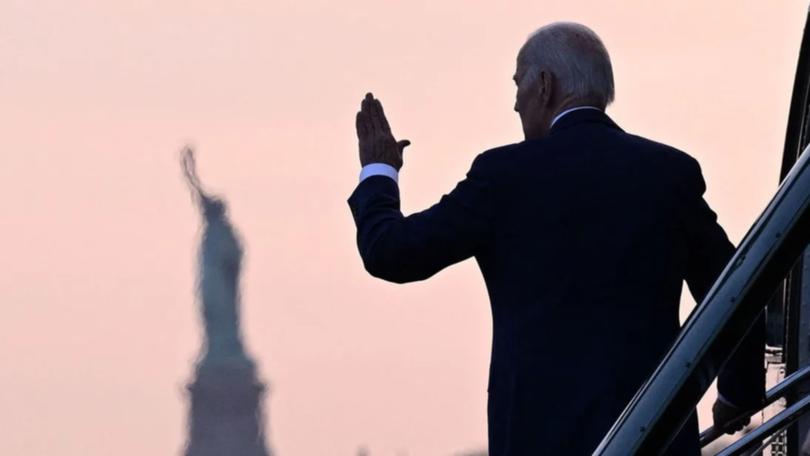THE ECONOMIST: How could Democrats replace Joe Biden as their candidate for president?
And who would replace him on the ticket?

President Joe Biden’s performance in his televised debate with Donald Trump could hardly have gone worse.
With Democratic figures asking if a way can be found to replace him as the candidate for the election in November, what are the options? The main trouble is that he has comfortably secured enough delegates to win his party’s nomination.
That means that only one person can change who will be the Democratic candidate to face Donald Trump: Mr Biden himself.
Sign up to The Nightly's newsletters.
Get the first look at the digital newspaper, curated daily stories and breaking headlines delivered to your inbox.
By continuing you agree to our Terms and Privacy Policy.The rules do not allow for a rerun of a popular election. To become the party nominee, a candidate needs to win a majority of delegates to the Democratic National Convention.
The number needed is 1,968 and Mr Biden has already gathered 3,894 because he has run virtually unopposed.
No one, including delegates to the convention, can force the president to step aside.
But if he were persuaded to withdraw (whether by his wife or by a posse of Democratic grandees), these delegates would become unbound and therefore free to vote for the nominee of their choosing.
That would convert the election into a contest for the support of elites rather than the popular contest that it is supposed to be; candidates to replace him would need to woo the party’s patricians.
If a candidate failed to win an absolute majority on the first ballot, as may be the case if Mr Biden were to quit, then 700 “super-delegates” (usually former senior party officials) would also be permitted to cast their votes.
The Democratic national convention in Chicago on August 19th-22nd would thus revert from its modern form—a four-day bout of pageantry—to its old-fashioned way of working: four days of back-room haggling.
The party could well emerge deeply divided after such tumult. America has not witnessed such a contested convention since 1976 when Republican Party bosses plumped for Gerald Ford over Ronald Reagan.
Suppose Mr Biden soldiers on through the convention, securing the nomination despite the deepening misgivings about him, but then fell ill and was unable to contest the election.
The Democratic National Committee, which consists of a few hundred party operatives, would then decide whom to place at the top of the ticket.
Such a meeting has been required only once before, in 1972, when the Democrats’ vice-presidential candidate, Thomas Eagleton, had to withdraw after revelations that he had suffered from depression and received electroshock therapy.
It is likely that the crown would pass in this instance to the vice president, Kamala Harris.
Mr Biden appears loyal to her as his running-mate, and his blessing for any replacement for him would count for a lot.
Yet her shakiness as a candidate is thought to be one of the reasons Mr Biden has been reluctant to bow out.
Ms Harris, who ran a disastrous campaign for the presidency in 2020, would almost certainly attract challengers, especially if Mr Biden were to withdraw his candidacy before the convention.
Only a third of Americans think she would beat Mr Trump, according to a poll in May 2024 for Politico by Morning Consult.
Although it would be awkward in an identity-conscious party to attempt to bypass the first black and the first female vice president, some rivals would probably try.
Who might they be?
The first place to look is the pool of Democratic governors.
Gavin Newsom, the governor of California, would plainly love to be president and has built a formidable political machine.
The governor of Illinois, J.B. Pritzker, is similarly ambitious and has an inherited fortune worth billions to help in any campaign.
The moderate governors whom many Democrats see as best-placed to take on Mr Trump—such as Andy Beshear of Kentucky, Josh Shapiro of Pennsylvania or Gretchen Whitmer of Michigan—might struggle to muster the money and the organisation to mount an effective campaign.
Other potential contenders might be senior figures from the Biden administration. The most impressive political talents in his cabinet include Pete Buttigieg, the secretary of transportation, and Gina Raimondo, the secretary of commerce. Raphael Warnock, the senator for Georgia, is charismatic, a gifted speaker and represents a swing state.
Whether it happens before or (especially) after the convention, putting in place a substitute for Mr Biden would be messy and contentious.
Such a rowdy spectacle is hardly ideal for Democrats heading into a vital election. But it would be one way to achieve what has proved remarkably difficult in recent years: sucking attention away from Mr Trump.
